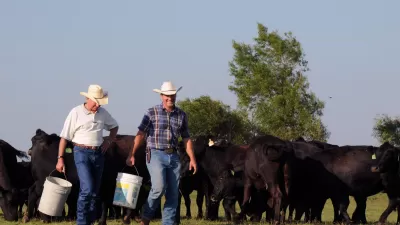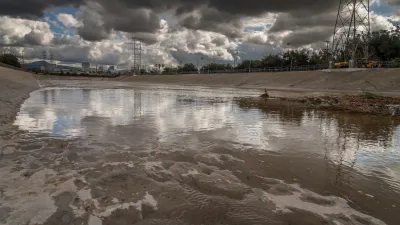Common Ground is a recently released documentary which urges viewers to rethink our relationship with soil and approach to agriculture and food production.

Are you familiar with the term “regenerative agriculture”? Essentially, it is a conservation and rehabilitation approach to land management and food production and is the focus of the documentary Common Ground. Unlike industrial agriculture, this approach focuses on topsoil regeneration, increasing biodiversity, improving the water cycle, enhancing ecosystem services, supporting bio-sequestration, increasing resilience to climate change, and strengthening the health and vitality of farm soil.
As Siri Chilukuri explains in her review of the film, regenerative agriculture uses a variety of methods to promote healthy, living soil, which in turn promotes healthy crops that are more pest resistant and require less or no chemical pesticides. This is in sharp contrast to industrial farming which encourages the heavy use of synthetic pesticides and herbicides, causing an array of illnesses and damage ecosystems. Regenerative agriculture also mitigates climate change through carbon dioxide removal, i.e. it draws carbon from the atmosphere and sequesters it.
While Common Ground focuses on food and farming systems, it can also prompt viewers to think more broadly and globally about our relationship with the land and the need to heal it. The idea of land regeneration, for example, is consistent with the push to restore additional degraded lands such as brownfields and oilfields into parks, open space, and other land uses that generate multiple benefits to communities.
To learn more about movie and the merits of the regenerative approach, please read the source article.
FULL STORY: This Earth Day, Common Ground Urges us to Rethink Our Relationship With Soil

Planetizen Federal Action Tracker
A weekly monitor of how Trump’s orders and actions are impacting planners and planning in America.

San Francisco's School District Spent $105M To Build Affordable Housing for Teachers — And That's Just the Beginning
SFUSD joins a growing list of school districts using their land holdings to address housing affordability challenges faced by their own employees.

The Tiny, Adorable $7,000 Car Turning Japan Onto EVs
The single seat Mibot charges from a regular plug as quickly as an iPad, and is about half the price of an average EV.

Seattle's Plan for Adopting Driverless Cars
Equity, safety, accessibility and affordability are front of mind as the city prepares for robotaxis and other autonomous vehicles.

As Trump Phases Out FEMA, Is It Time to Flee the Floodplains?
With less federal funding available for disaster relief efforts, the need to relocate at-risk communities is more urgent than ever.

With Protected Lanes, 460% More People Commute by Bike
For those needing more ammo, more data proving what we already knew is here.
Urban Design for Planners 1: Software Tools
This six-course series explores essential urban design concepts using open source software and equips planners with the tools they need to participate fully in the urban design process.
Planning for Universal Design
Learn the tools for implementing Universal Design in planning regulations.
Smith Gee Studio
City of Charlotte
City of Camden Redevelopment Agency
City of Astoria
Transportation Research & Education Center (TREC) at Portland State University
US High Speed Rail Association
City of Camden Redevelopment Agency
Municipality of Princeton (NJ)





























